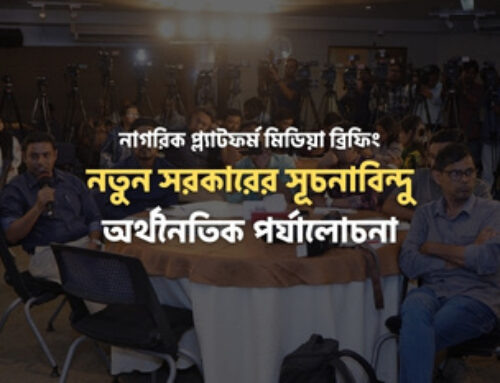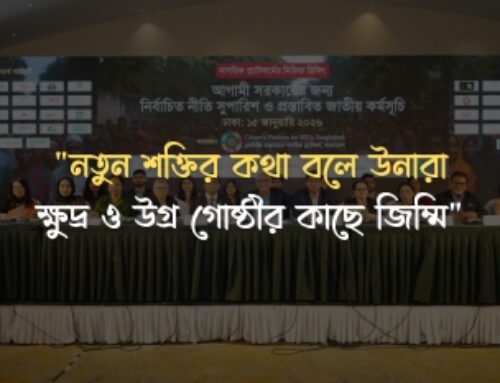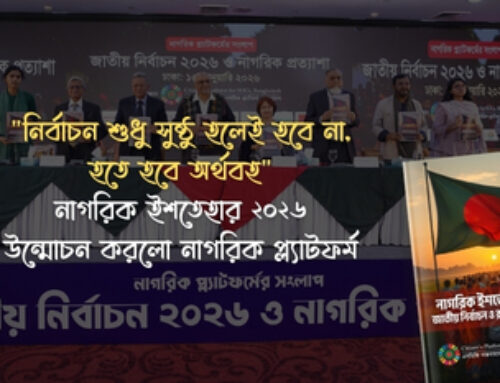
Marginalised people should be made visible in the national development landscape. If they are not made visible here, if their voices are not heard, then the desire that we have for policy change will not be realized. In the past 15 years of experience and statistics, it is an obvious fact – inequality has increased in Bangladesh. Inequality not only in wealth or money but also consumption has increased. Disadvantaged people could not be pioneers in terms of education, health and consumption.
Dr Debapriya Bhattacharya, Convenor, Citizen’s Platform for SDGs, Bangladesh and Distinguished Fellow, Centre for Policy Dialogue (CPD) stated this is his introductory remarks in the media briefing titled “Civil Agenda for Inclusive Development and Equity: Education, Health, Climate Change and Social Protection.” It was held on Wednesday, October 11, 2023, at the BRAC Centre Inn Auditorium, Mohakhali, Dhaka.
The event was organised by the Citizen’s Platform in association with UKAid Bangladesh, ActionAid Bangladesh, Centre for Policy Dialogue (CPD), Concern Worldwide, Manusher Jonno Foundation, The Asia Foundation, Transparency International Bangladesh (TIB) and WaterAid Bangladesh.
Ms Shaheen Anam, Core Group Member, Citizen’s Platform for SDGs, Bangladesh and Executive Director, Mansuher Jonne Foundation chaired the briefing.
Professor Mustafizur Rahman, Distinguished Fellow at the Centre for Policy Dialogue (CPD) and core group member, Citizen’s Platform for SDGs, Bangladesh facilitated the discussion.
Distinguished speakers were, Dr Mostafizur Rahaman, Deputy Director, CAMPE, Mr Estiaque Bari, Senior Lecturer, Department of Economics, East West University, Dr Yasmin H Ahmed, Advisor, Health Watch, and Dr. M. Abu Eusuf, Professor, Department of Development Studies, Director, Centre on Budget and Policy, University of Dhaka and Executive Director, Rapid.

Dr Mostafizur Rahaman presented primary educational issues. In his speech, he questioned about children from religious minorities, street children, children with disabilities and many more who lack in getting education opportunities. Major recommendations for such could be planning for universal and inclusive education including implementation of Multilingual Education (MLE) in languages of ethnic minorities, expansion of mid-day meals programme, ensuring qualified teachers, ensuring access to digital facilities for all, stipend facilities and special incentive programme for dropout students, establishment of schools with residential facilities in hard-to-reach areas.
Dr Yasmin H Ahmed emphasized the lack of coordination in the health sector. The marginalised communities are far from receiving basic health services. Lack of regulation, accountability, and below-average quality are missing in the sector. There is no proper health technology, and machine operators, and brokers harassing the patients are unholy practices seen in every government hospital. Major recommendations, quality drugs affordable for all, ensuring healthcare for marginalised groups, breaking the culture of nexus and kickback, and strengthening institutions.
Mr Estiaque Bari shared insights on climate change. He said Bangladesh is the 7th most climate-vulnerable country in the world. In many ways directly and indirectly climate change is affecting our country. Major recommendations could be the implementation of all interventions mentioned in the National Adaptation Plan (2023–50) and ensure that national Five-Year Development Plans are aligned with those. Others are the identification of local knowledge to mitigate the local climate effects, and introducing a special social safety net transfer programme in support of marginalised groups living in Haor areas.
Dr. M. Abu Eusuf presented statistical facts on Social Protection. He suggested developing universal social protection (USP) for all aligning with International Human Rights that will focus on the left behind communities and in achieving SDG targets. As a major recommendation, he suggested having a comprehensive need-based assessment of vulnerable communities. Its result will inform the policymakers for scaling up the social protection programmes. Establishment and mobilisation of district job centres to connect left behind groups to productive jobs. Introduction of grievance redressal system (GRS) and establishment of monitoring and evaluation system for USP which can provide data if the conditions are improving or not.
Following the speaker presentations, Dr Debapriya Bhattacharjee opened the floor for media.
In response to a question, Dr Bhattacharjee said that there is visible development in Bangladesh. We have progressed no doubt. But people who are in danger, could not reach them properly. Justice must be brought into development. The role of backward people should be brought forward. Bringing back the fairness of development is the challenge of the future. Democratic accountability gives space to the backward people. The biggest field of action is election. Election promises should be brought forward. The development of backward people has to be presented again and again.
Addressing a question about the middle class, he said, the middle-class society of Bangladesh has become weak. has decayed. The decline of middle-class society has economic, political and cultural significance. They played a major role in developing the cultural values and political values of Bangladesh. But in recent times that role has become murky. Because of this, we have fallen behind.
Ms Shaheen Anam concluded the briefing by thanking panelists, journalists and all.





Leave A Comment